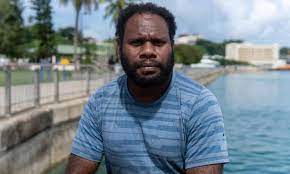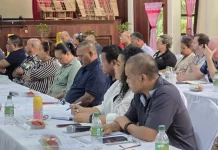A police crackdown in Vanuatu that has seen people arrested for allegedly posting comments on social media speculating politicians were responsible for the country’s current Covid outbreak has raised serious concerns about freedom of speech in the Pacific country.
At least four people from two separate islands have been arrested as part of a major investigation by Vanuatu’s Serious Crime Unit in the last few weeks, including a factory worker, a printer, a business owner, and a Facebook page moderator. They face charges of cyber stalking, cyber slander, and cyber libel and face up to three years in prison and fines of up to three million Vatu (US$25,838).
The charges relate to alleged comments on Facebook claiming that two politicians in the country had breached Covid quarantine protocols, one of which had played a role in the community transmission of the virus.
These are the first arrests under Vanuatu’s new cybercrime legislation passed into law last year. Australia has been working with Vanuatu to bolster its cybersecurity capability as part of its overall diplomatic efforts to combat China’s rising influence in the region.
According to the explanatory note introducing the legislation, the government said the act was to combat cybercrime, which it called “a global phenomenon that poses threats to Vanuatu’s national infrastructure, public service delivery, commercial and financial security.”
Vanuatu’s Opposition leader Ralph Regenvanu has accused the government of using the laws for political ends.
“What is happening now is that the government and the police are using the excuse of the lockdown restrictions being lifted to basically just try and clamp down on dissent, on anyone having any different views.”
Andrea Woi, 38, a single mother and factory processor, is one of those charged with criminal slander and cyber stalking.
Investigators flew from the capital of Port Vila to the northern island of Santo to her workplace on 26 April to arrest her. She was taken from to the police station in Luganville and told she was facing serious charges which could result in three years’ imprisonment, and a fine of up to three million Vatu(US$25,838).
“Three police officers came to my workplace and asked for me. I heard one police officer say to the other that I was a suspect. They told me my case was very serious and that I could go to jail for three years. I was very scared,” said Woi.
She is accused of making a comment on a Facebook post insinuating an MP – Anthony Iauko – had breached quarantine, something he denies.
Woi has since been told she must fly to Port Vila to answer the charges this month. Her family has had to talk her out of resigning her job in shame.
Witnol Benkor Tor, a Facebook moderator of a news site known as Vanuatu Politics and News, was one of the first to be charged under the police crackdown. He has been charged with cyber libel, cyber slander and cyber stalking and also faces up to three years’ imprisonment and a fine of up to three million Vatu.
He was charged after someone posted on his Facebook page under a pseudonym, making allegations that Iauko breached Covid rules to visit someone in quarantine. Tor says he does not know who wrote the post.
“I am worried about what this means for freedom of speech,” said Tor. “I posted nothing wrong myself. I am simply one of the moderators of a page. When I set up the Vanuatu News and Politics page, I invited people from both sides of politics to help moderate it in the interests of balance.”
The Facebook page has since been taken down, though not by Tor.
The Guardian has confirmed four people have been charged in the crackdown, but Tor believes there are many others too. He said when he was taken to the police station there was a long list of names on the wall of people the Serious Crimes Unit was investigating.
Prior to the arrests, the government used a regular Covid briefing which was broadcast live on Facebook to outline charges of cyber libel, cyber slander and cyberstalking that now exist under the new legislation.
Vanuatu police were contacted for comment.
The crackdown was initiated following the discovery of the first case of the virus in the community earlier this year, signalling that Vanuatu’s days as a Covid-free nation were over.
Vanuatu was one of the last countries in the world to experience the impact of community transmission from the coronavirus pandemic, only recording cases among returning citizens or visa holders, who were isolated and successfully treated in quarantine before being allowed to return home.
However, in March, the virus spread to the community and health authorities issued a statement saying the transmission must have resulted from a breach of quarantine.
On 05 March, Anthony Iauko, a government MP, presented at the country’s main hospital feeling unwell and tested positive for the virus.
The opposition leader Ralph Regenvanu issued a statement on 08 March alleging that Iauko unlawfully entered quarantine several times and also that he took people out of quarantine to socialise with him.
Iauko has denied these claims and says he contracted Covid when he visited the hospital.
There was widespread speculation in media and on social media in Vanuatu that Iauko was “Case Zero” – the case that started community transmission.
Health officials have confirmed to the Guardian that Iauko was the first reported locally acquired Covid case in the country.
When contacted by the Guardian, Iauko declined to comment and said to “contact my lawyer”, but did not provide the lawyer’s name or phone number.
Regenvanu lodged a complaint with police against Iauko in March for allegedly breaching the Public Health Act. Vanuatu’s police chief has confirmed the investigation into Iauko has been dropped.
Regenvanu also made allegations against the country’s deputy prime minister Ishmael Alatoi Kalsakau, accusing him of leaving quarantine before the end of a seven-day quarantine extension without gaining official clearance. Kalsakau did complete the initial 14 days in quarantine. He is not accused of spreading the virus as a result of the alleged breach.
“The DPM (deputy prime minister) came on a New Zealand flight on 20 February with 19 passengers who were later tested positive. The protocol is to extend the quarantine of all passengers on the same flight for a further seven days,” Regenvanu said in his statement.
“He was home by last Sunday afternoon while his fellow passengers remain in [extended] quarantine in accordance with the law.”
Kalsakau told local media he received authorisation to leave after 14 days and tested negative three times before leaving quarantine. He also said that he asked the Ministry of Health if there was anything preventing him from leaving quarantine after 14 days and did not receive a response.
Regenvanu has submitted a request under freedom of information laws to receive a copy of the recommendation from a medical officer that Kalsakau could be discharged from a quarantine facility.
Kalsakau was contacted for comment.
Thirteen people have died since the Omicron strain was detected in Vanuatu in March. The virus has now spread to five of the country’s six provinces. There have been almost 7,000 confirmed cases in Vanuatu since the beginning of the year.
SOURCE: THE GUARDIAN/PACNEWS













